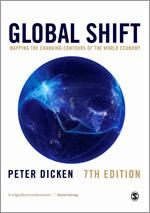Global Shift
Mapping the Changing Contours of the World Economy
Global Shift
Welcome to the companion website for the seventh edition of Global Shift by Peter Dicken.
This website offers a wide range of learning and teaching resources, including:
For students:
- Student Notes including applied case studies, further reading and discussion questions
- Glossary flashcards to help you revise key terms
- Selected readings across Geography, Sociology and Politics
At the start of each chapter of your textbook you'll find a QR code. Scan any of these QR codes to go straight to the online resources for that chapter.
For lecturers:
- Lecturer notes offering suggestions for discussion questions, exercises, further reading and multimedia that you can incorporate into your teaching
- PowerPoint slides that can be used in lectures or edited to fit your needs
Peter Dicken introduces the new, 7th edition of Global Shift: how do we understand the complexity of globalization: five approaches
"No other book concerned with economic globalization was able to match earlier editions in either breadth or empirical richness, but this latest Global Shift 7e is a book whose time has truly come. Coined by Peter Dicken in the mid 1980s, the idea of a ‘global shift’ has now been propelled into wider circulation as the world grapples with the reality of a maturing Asian and other BRICs economies, and this latest edition is beyond authoritative in terms of its empirical depth and insight into this issue.”
Andrew Jones, Professor of Economic Geography, City University London.
“This is the definitive account of the economic geography of globalisation. With each edition it just gets better!”
Ray Hudson, University of Durham
'There is no other book that so comprehensively examines the meaning, dynamic and uneven impact of economic globalisation. The analysis extended to cover the current financial crisis takes the mastery of the book to new and pertinent heights.'
Ash Amin, University of Cambridge.
‘The earlier editions of this book made an excellent contribution towards an understanding of the global business environment and challenges. The present edition takes us further towards our understanding of the role played by multinational enterprises, governments and other organizations in managing these challenges. It provides theoretical understanding of fundamental issues that we face today such as; sustainable development, poverty and inequality and highlights the problems with global governance.
The book is a must read for those who want to be up-to-date with global issues and challenges and how multinationals and governments are interacting to handle these challenges. The book also provides some guidelines for better management and governance.’
Professor Pervez Ghauri, King’s College London, UK.
‘Once again Peter Dicken seamlessly combines disciplinary perspectives to create a wonderfully comprehensive insight into the essential dynamics of the global economy. His usual array of fabulous maps, graphs, tables and frameworks brilliantly animate this, his latest and most readable edition of ‘Global Shift’.’
Simon Collinson, Professor of International Business and Innovation and Dean of Birmingham Business School.
‘Global Shift is rightly one of the most influential books examining the changing geography of globalisation and the world economy. Global in scope, and geographically nuanced, this new edition provides the kind of authoritative account of the interdependent world economy which shapes our lives that is required by those seeking to understand the complexity of changing power relations in the world today.’
Adrian Smith, School of Geography, Queen Mary University of London.
Global Shift is – quite simply - the definitive work on economic globalization. The extensive use of graphics, lack of jargon, and clear definition of terms, has made it the standard work for the social sciences.
This edition has been completely updated using the latest available sources. It maps the changing centre of gravity of the global economy in the context of the global financial crisis. Each chapter has been extensively rewritten and new material introduced to explain the most recent developments. It provides:
- the most comprehensive and up-to-date explanation of economic globalization available, examining the role of transnational corporations, states, labour, consumers, organizations in civil society, and the power relations between them
- a clear guide to how the global economy is being transformed through the operation of global production networks involving transnational corporations, states and interest groups and technology
- a focus on the fundamental issues of employment, unemployment, inequality, poverty and development, both between and within developed and developing countries
- extended discussion of problems and institutions of global governance in the context of the global economic crisis and of the role of corporate social responsibility
- critical discussion of different theories of economic globalization
- this edition is produced in four colour and has extensive online ancillaries
There is only one definitive guide to economic globalization for the social sciences: this is it.
For instructors
Access resources that are only available to Faculty and Administrative Staff.
Want to explore the book further?

